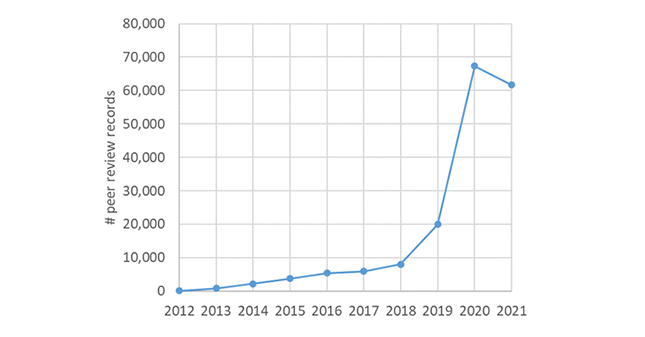Für die anstehende Reform des WissZeitVG kommen immer mehr Vorschläge aus allen Bereichen der Wissenschaft zusammen. Längere Promotionsverträge, zwingender Institutions-Wechsel und eine große Portion Planwirtschaft – alles dabei! Ein Überblick.
Postagens de Rogue Scholar

This is a transcript of the interview with Monica Granados (Season 2, Episode 7). Listen to the podcast on Anchor. The transcript is slightly edited for readability and available under a CC0 Public Domain Dedication. Chris Hartgerink: Welcome to another episode in the second season of the Open Update. For Liberate Science. I'm your host, Chris Hartgerink.

Twenty years ago, Fiona Godlee, at that time Editorial Director for Medicine at open access publisher BioMed Central, wrote a sharp critique of the traditional system of closed pre-publication peer review, arguing that the system needs to be opened and drawing attention to the opportunities offered by “preprint servers combined with open commentary” to realize this openness.
This is a transcript of the interview with Wendy Ingram (Season 2, Episode 6). Listen to the podcast on Anchor. The transcript is slightly edited for readability and available under a CC0 Public Domain Dedication. Chris Hartgerink: Welcome to the second season of the Open Update. For Liberate Science, I'm your host Chris Hartgerink.
Wozu machen wir eigentlich wissenschaftliche Nachwuchsförderung? Meine drei Lieblingsfragen, um jedem Förderprogramm auf den Zahn zu fühlen – richtig gemein, aber unbedingt notwendig.

It may sound theoretical, but it is a powerful directional vehicle: A business’ Theory of Change . Here we introduce the results of our collaboration with Cathleen Berger to create our unique approach to making an impact. Liberate Science aims to distribute the production and consumption of research in an equitable, fair manner – fostering open research as a result.
!-- THEME DEBUG -- !-- THEME HOOK: 'field' -- !-- FILE NAME SUGGESTIONS: * field--node--title--blog.html.twig x field--node--title.html.twig * field--node--blog.html.twig * field--title.html.twig * field--string.html.twig * field.html.twig -- !-- BEGIN OUTPUT from 'themes/contrib/classy/templates/field/field--node--title.html.twig' -- span class=field field--name-title field--type-string field--label-hiddenUtilizing Secondary Qualitative
This is a transcript of the interview with Tamarinde Have (Season 2, Episode 5). Listen to the podcast on Anchor. The transcript is slightly edited for readability and available under a CC0 Public Domain Dedication. Chris Hartgerink: Welcome to the second season of the Open Update. For Liberate Science, I'm your host, Chris Hartgerink.
Der Streit zwischen ‘Wissenschaft im Dialog’ und seinen Gesellschaftern wirkt zunächst wie eine Debatte um Wissenschaftskommunikation. Aber der Fall WiD zeigt: Es gibt bisher keine gute Lösung, wie begleitende Strukturen in der Forschungslandschaft finanziert werden.
This is a transcript of the interview with James Bridle (Season 2, Episode 4). Listen to the podcast on Anchor. The transcript is slightly edited for readability and available under a CC0 Public Domain Dedication. Chris Hartgerink: Welcome to the second season of the Open Update. For Liberate Science I'm your host, Chris Hartgerink.